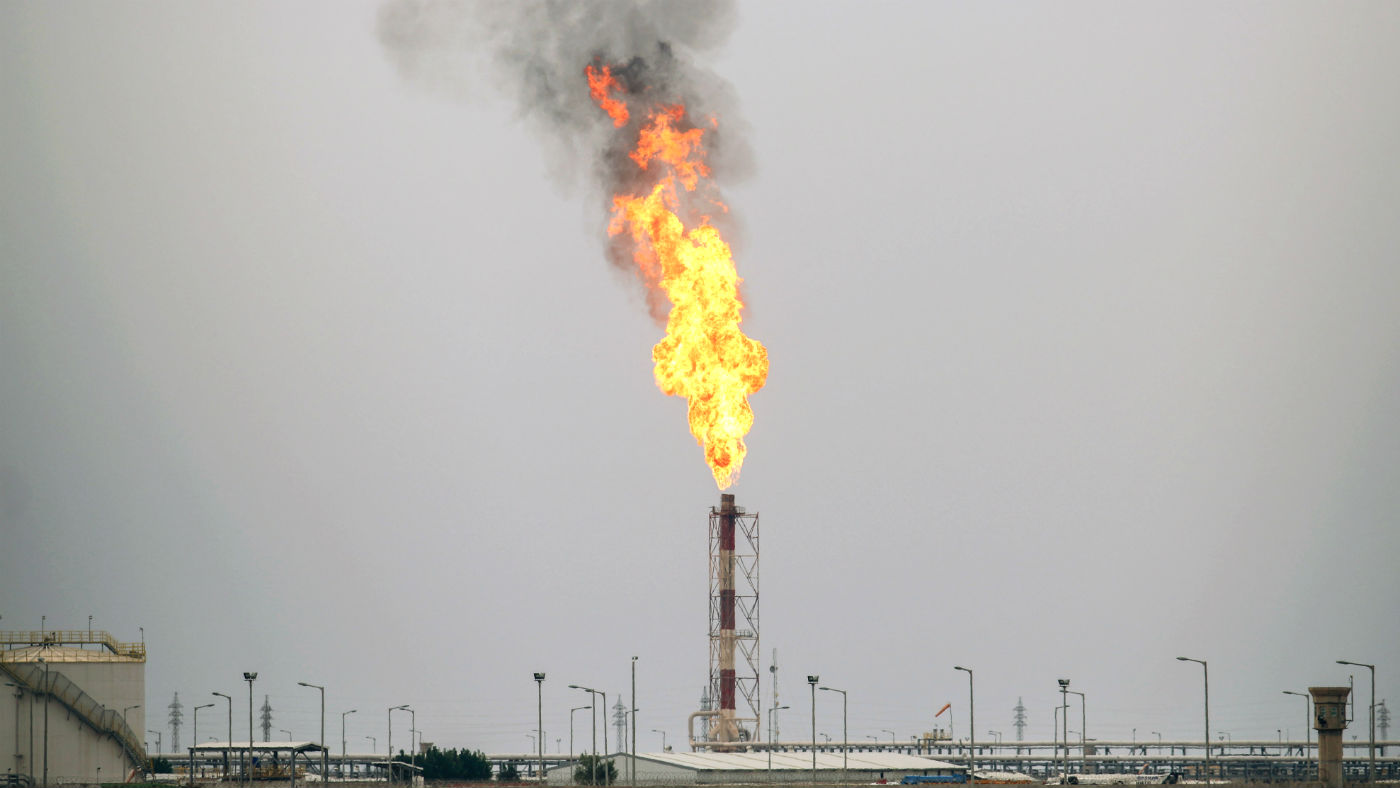Oil price posts two-year highs - but how long can it last?
Brent rose above $59 a barrel this week, its best third-quarter showing since 2004

A free daily email with the biggest news stories of the day – and the best features from TheWeek.com
You are now subscribed
Your newsletter sign-up was successful
Oil price slumps on 'most bearing report of all time'
03 November
Oil slumped close to three per cent on Wednesday following an ultra-bearish report on US reserves.
The energy regulator revealed raw crude stockpiles surged by 14.4 million barrels last week, the biggest gain on record and 14 times the consensus estimate of a one-million-barrel increase.
The Week
Escape your echo chamber. Get the facts behind the news, plus analysis from multiple perspectives.

Sign up for The Week's Free Newsletters
From our morning news briefing to a weekly Good News Newsletter, get the best of The Week delivered directly to your inbox.
From our morning news briefing to a weekly Good News Newsletter, get the best of The Week delivered directly to your inbox.
"You could easily make the argument it's the most bearish report of all time," Bob Yawger, of Mizuho Securities USA, told the Wall Street Journal. "There’s nothing to support the market."
Until last week, raw oil stocks had fallen for seven out of eight weeks. "All the barrels you were wondering what ever happened to them came roaring back in one report," Yawger added.
The news added to fears about market oversupply and prompted oil prices to fall to levels not seen since prior to Opec's shock supply announcement on 28 September.
Brent crude, which sets global prices, fell 2.6 per cent to below $47 a barrel, while its US counterpart, West Texas Intermediate, fell close to three per cent to less than $45 a barrel.
A free daily email with the biggest news stories of the day – and the best features from TheWeek.com
While reserves of refined products such as petrol and diesel dropped by 2.2 and 1.8 million barrels respectively, this did nothing to support sentiment.
"This is very, very, very bearish. Nothing else in the report matters," James L Williams, an energy economist at WTRG Economics, told Reuters.
It doesn't help matters that refined product reserves often rise when raw crude rises, suggesting there is not sufficient underlying demand to sustain the level of refinery activity needed to run down a huge overhang of oil.
The oil price has now fallen 12 per cent in two weeks following a brief rally in the wake of Opec announcing a deal to cut supplies, which sent Brent to a 2016 high of close to $54. Doubts have since surfaced that the agreement will be finalised.
There was some support for the market this morning after an attack on an oil pipeline in Nigeria, which Reuters says is seen as negative for supplies. Brent rose 0.6 per cent to $47.14 a barrel.
US oil price could slump to $45 a barrel today
2 November
Analysts are warning that the oil price could fall significantly again today, below the level before a shock Opec supply deal announcement sent it rallying strongly at the end of September.
Yesterday, both the international oil price benchmark Brent crude, and its US counterpart West Texas Intermediate (WTI), fell for a fourth consecutive day, touching one-month lows.
Both were sliding again this morning and heading towards the nadir reached on 27 September, the day before the 14-nation Opec cartel announced it would cut production by up to one million barrels a day.
Brent touched close to $54 a barrel in the weeks that followed, but optimism among traders has been waning as Opec members including Iraq, Iran, Nigeria, Libya have all refused to take a share of the output reductions.
Sentiment on supply has also been hit by data showing a continued production glut.
Last night the American Petroleum Association published a weekly report showing a massive 9.3 million barrel build in US stockpiles last week, which Reuters notes is "nine times the amount expected by analysts".
More reliable and comprehensive data is due to be published by the US energy watchdog, the Energy Information Administration, this afternoon.
If that data shows a similarly "terrifying" increase in reserves, WTI could "easily" drop back to $45 a barrel, Phil Davis, a crude oil trader at PSW Investments, told Reuters. A similar drop would see Brent fall back towards $46.
This morning, WTI and Brent were both down around 1.5 per cent, to $45.96 and $47.43 a barrel respectively.
Beyond this afternoon's report, there are fresh predictions that the oil price could fall back below $40 a barrel if Opec does fail to finalise those production cuts at its regular meeting in Vienna at the end of this month.
That's the latest prediction from Goldman Sachs, says Oilprice.com. The investment bank noted that Opec had agreed a long-term strategy this week in line with supply cuts but said there is "declining probability" of a deal being agreed, not least after new data showed the bloc's output rose to a new record in October.
BP profits halve as low oil price continues to bite
1 November
British oil giant BP has posted third-quarter profits that are half the level seen last year as it continues to struggle with the low oil price.
BP explicitly blamed the prolonged oil price slump for the fall, saying it was affected by a "weaker price and margin environment".
However, it also insisted it was adapting to the weaker price levels and said it is "on track to rebalance organic cash flows next year at $50 to $55 a barrel".
Rival Shell also posted results this morning that showed third-quarter profits rose 18 per cent to $2.8bn (£2.2bn) year-on-year.
It also warned that the low oil price was taking a toll on the business, however, saying the outlook remains "uncertain". It is seeking to sell $30bn (£24.5bn) worth of assets to reduce debts after the purchase of BG Group.
Shell's share price was up 3.8 per cent this morning, while BP's was down 2.4 per cent.
Oil prices continued to struggle today as doubts persist over the Opec deal to cut production.
News that a number of member countries, including Iraq, Iran, Nigeria and Libya, are seeking an exemption from the plan has undermined confidence that an agreement on how to implement a collective one-million-barrel-a-day reduction will be achieved.
Sentiment has been further hit by estimates showing another record month of Opec output in September, Reuters reports.
Brent crude, the international oil price benchmark, fell more than three per cent on Monday to below $48 a barrel, before recovering a little this morning to around $48.70. West Texas Intermediate fell more than four per cent to below $47 a barrel.
Prices were offered some support following the news of an explosion in the on the Colonial gasoline pipeline in the US.
This could hit supplies of refined crude oil to from the refining hub on the US Gulf coast to markets in the east, says the Financial Times, and could lead to greater demand on other sources.
Opec deal doubts send oil price to lowest in a month
31 October
Two important meetings passed at the weekend without any specific agreement on Opec member state supply cuts or support from other oil producers for an output deal next month.
With only a month to go until the 14-nation cartel is due to finalise its deal to cut overall exports by up to one million barrels a day, the failures have added to fears the agreement will ever be ratified.
Brent crude, the international oil price benchmark, was this morning trading at $49.54 a barrel, 23 cents above its overnight nadir that marked the lowest level since 30 September.
US counterpart West Texas Intermediate was 20 cents above its previous-session low of $48.42 a barrel, a level not seen for three weeks.
On Friday, Opec representatives met to try and agree principles for production quotas to help the overall supply cut. However, Iraq instead demanded an exemption, says Bloomberg.
It joins Iran, Nigeria and Libya in asking for a waiver to allow them to build oil revenues. More countries may follow.
"It might be impossible for Opec to come to an agreement on making cuts," said Mark Watkins, an investment manager at US Bank, which oversees $136bn in assets. "The best that can realistically be expected is a freeze."
A meeting on Saturday between senior Opec members and representatives of other producers also ended without the likes of Russia or Canada making any commitment to join the deal.
"Non-Opec producers made no specific commitment on Saturday to join Opec in limiting oil output levels to prop up prices, suggesting they wanted the oil producing group to solve its differences first," says Investing.com.
However, analysts caution against giving up on the deal at the 30 November meeting in Vienna, citing the impact on prices and the financial impact on member countries.
Many also suggest de facto Opec leader Saudi Arabia's production might already have peaked and that it might be prepared to pick up the slack.
"Right now, it's not looking good, but these things always go right down to the wire," said Mike Wittner, the head of oil-market research at Societe Generale SA in New York, told Bloomberg.
"There's an awful lot at stake here. If they don't reach an agreement, oil will fall like a rock and be testing $40 in no time."
Oil price recovers $50 level on Venezuela unrest
27 October
International oil price benchmark Brent crude fell below $50 a barrel for the first time in three weeks yesterday following news that the likes of Iraq, Nigeria and Libya may opt out of an Opec agreement to cut production.
Apparent dissent in the ranks is adding to fears the deal, which is seen as an essential help to rebalance an oversupplied market, will never be fully agreed.
Release of official figures showing a surprise fall in US crude reserves added to the shift in sentiment.
Headline stocks dropped by 553,000 barrels, while stored refined products such as petrol and diesel fell by a slightly greater amount, says the Energy Information Administration.
Gains were limited on the back of a three-session losing streak, however.
ANZ Bank said the drop in US oil reserves was misleading as it centres on west coast storage hubs and "inventories actually increased along the East and Gulf Coasts", reports Fox News.
Meanwhile, attention is still focused on the Opec deal and widespread analyst doubts it will be secured.
"Many traders in the market actually laugh at the thought that Opec would ever reach a deal," Michael McCarthy, the chief markets strategist at CMC Markets in Sydney, told MarketWatch. "And if even a deal is made, people don’t think the quotas will be observed."
-
 Corruption: The spy sheikh and the president
Corruption: The spy sheikh and the presidentFeature Trump is at the center of another scandal
-
 Putin’s shadow war
Putin’s shadow warFeature The Kremlin is waging a campaign of sabotage and subversion against Ukraine’s allies in the West
-
 Media: Why did Bezos gut ‘The Washington Post’?
Media: Why did Bezos gut ‘The Washington Post’?Feature Possibilities include to curry favor with Trump or to try to end financial losses
-
 How might the Israel-Hamas war affect the global economy?
How might the Israel-Hamas war affect the global economy?Today's Big Question Regional escalation could send oil prices and inflation sky-high, sparking a worldwide recession
-
 Recent mega-mergers could signal a turning point for the US oil industry
Recent mega-mergers could signal a turning point for the US oil industryTalking Point Both Chevron and Exxon have recently spent billions to acquire smaller oil companies
-
 Has Saudi Arabia lost control of oil prices?
Has Saudi Arabia lost control of oil prices?Today's Big Question Kingdom goes it alone to cut production, risking tension with US and reigniting cooling inflation in Europe
-
 US angered by Opec+ oil cut
US angered by Opec+ oil cutSpeed Read Energy prices to rise further as producers slash supply by two million barrels a day
-
 Global oil demand forecast lowered for 2020 and 2021
Global oil demand forecast lowered for 2020 and 2021Speed Read IEA report says jet fuel demand remains the major source of weakness
-
 Are US-Iran tensions flaring again?
Are US-Iran tensions flaring again?In Depth Trump threatens military action over Twitter
-
 Can a deal be struck to raise oil prices?
Can a deal be struck to raise oil prices?In Depth Opec+ will convene today over video link in a bid to boost crude
-
 What do negative oil prices mean?
What do negative oil prices mean?In Depth Perfect storm of oversupply and storage shortages sees producers paying to get rid of US crude